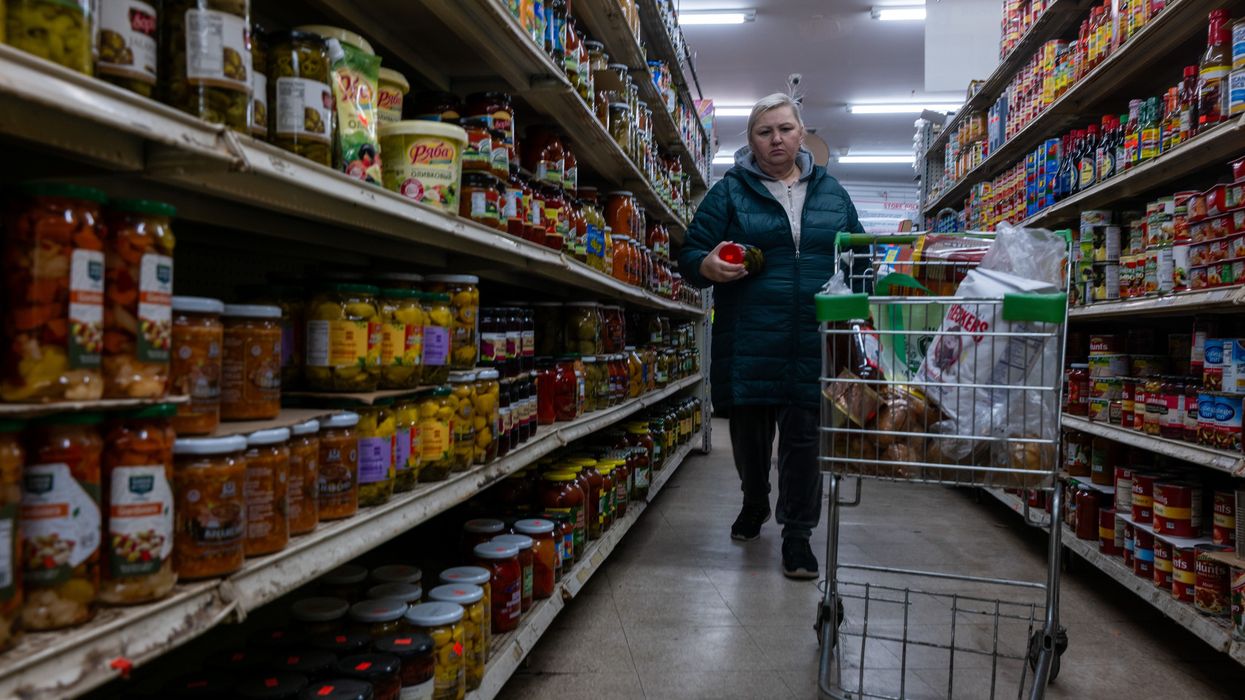August, 31 2009, 11:11am EDT

For Immediate Release
Contact:
Christina Lizzi, (724) 816-8350, clizzi@fwwatch.org
Erica Schuetz, (202) 683-4903, eschuetz@fwwatch.org
Food & Water Watch Supports Louisiana Shrimpers' Call for Fair Prices on Domestic Shrimp
BATON ROUGE, La.
Organizer Christina Lizzi of Food & Water Watch spoke at a rally last week, expressing solidarity with the shrimpers. "Both consumers and fishing communities benefit when local jobs in the fishery are maintained," she said. "Consumers can get fresh wild-caught seafood, and shrimpers can earn a living.'
Many shrimpers have been on strike for several days, and have been protesting in communities across Louisiana since last week. Last Monday, shrimpers protested in Delcambre, La., against two of the region's largest seafood distributors, urging them to shut down production until they could provide higher per-pound prices for the shrimp.
"It is repulsive to think sellers might be fixing U.S. wild-caught shrimp prices to match low-priced, imported farmed shrimp, and then selling that product to consumers at up to eight times the price for massive profits," said Food & Water Watch Executive Director Wenonah Hauter. "We urge swift action by our government to remedy the situation, and support Gulf of Mexico shrimpers in demanding fair prices."
Local politicians have responded to the call, including Billy Nungesser, president of Plaquemines Parish; Governor Bobby Jindal; and Representative Charlie Melancon. Senator David Vitter's office was represented at the protest by Malcolm Richard, regional director for Baton Rouge and Florida Parishes, who decried illegal dumping of cheap imports and the practice of "port-shopping."
Still, the shrimpers fear that action will not come soon enough. In a letter to President Obama urging action, the shrimpers explain the severity of their situation: "We have lost our last... season due to Hurricanes Gustav and Ike.... A lot of us have had our homes and automobiles repossessed and we are living with other family members. We cannot afford to buy clothing, food, school supplies or other basic essentials for our children.... Sadly, if something does not change, we will not have a vessel to shrimp with next year."
Shrimp is the most popular seafood in the U.S., and demand for it continues to skyrocket. Meanwhile, prices for shrimp in the U.S. remain at all-time lows. Much of the shrimp consumed in the U.S. is farmed in places like Thailand, China, and Vietnam, where health, safety, environmental and labor laws are lax or non-existent. On arrival in the U.S., less than two percent of all imported seafood is inspected. Shrimp that does get inspected has often been refused for filth and Salmonella contamination.
"At a time when many of us are trying save money, buying the cheapest seafood available may seem to make sense. But the actual cost - to the environment, U.S. jobs, consumers' health and more - associated with imported farmed shrimp is not factored into the price," said Marianne Cufone, director of the Fish Program at Food & Water Watch. "We can't afford to ignore the results of our seafood choices."
Food & Water Watch mobilizes regular people to build political power to move bold and uncompromised solutions to the most pressing food, water, and climate problems of our time. We work to protect people's health, communities, and democracy from the growing destructive power of the most powerful economic interests.
(202) 683-2500LATEST NEWS
'Cruel and Unconstitutional': Trump, RFK Jr. Escalate War on Trans Youth With Threat Against US Hospitals
"These proposed actions would put Donald Trump and RFK Jr. in those doctor’s offices, ripping healthcare decisions from the hands of families," said one critic.
Dec 18, 2025
President Donald Trump and Health and Human Services Secretary Robert F. Kennedy Jr. on Thursday unveiled new policies aimed at cutting transgender minors off from gender-affirming care.
As reported by the New York Times, Kennedy announced new proposed rules that would bar Medicare and Medicaid from sending any funds to hospitals that carry out gender-affirming care on transgender minors, a move that would essentially force these facilities to shut down given that spending from those two programs account for nearly half of all spending on hospital care.
Dr. Mehmet Oz, the administrator of the Centers for Medicare and Medicaid Services, warned during a news conference announcing the proposed rules that hospitals are "going to pay a very steep price" if they continue providing gender-affirming care to minors.
Many hospitals throughout the US are already under financial strain while bracing for the impact of the Medicaid cuts in this year's Republican-passed budget law, which are projected to total $1 trillion over the next decade.
Dr. Susan Kressly, president of the American Academy of Pediatrics (AAP), slammed Trump administration health officials for their "unprecedented actions and harmful rhetoric" while announcing the new proposed rules, which she described as a vast overreach by the federal government.
"These rules are a baseless intrusion into the patient-physician relationship," said Kressly. "Patients, their families, and their physician—not politicians or government officials—should be the ones to make decisions together about what care is best for them. The government’s actions today make that task harder, if not impossible, for families of gender-diverse and transgender youth."
Kelley Robinson, president of the Human Rights Campaign, hammered the Trump administration for being "relentless in denying healthcare to this country, and especially the transgender community."
"Families deserve the freedom to go to the doctor and get the care that they need and to have agency over the health and well-being of their children," Robinson added. "But these proposed actions would put Donald Trump and RFK Jr. in those doctor’s offices, ripping healthcare decisions from the hands of families and putting it in the grips of the anti-LGBTQ+ fringe."
The ACLU wasted no time in announcing that it would sue the administration if it goes forward with enacting the proposed rules, which it described as an unconstitutional attack on healthcare practices that have been endorsed by both the the American Medical Association and the AAP.
Chase Strangio, co-director of the ACLU’s LGBTQ and HIV Rights Project, accused the administration of launching "cruel and unconstitutional attacks on the rights of transgender youth and their families."
"By attempting to strip away essential healthcare, the administration is not 'protecting' anyone," Strangio added. "It is weaponizing the federal government to target a vulnerable population for political gain. Healthcare decisions belong to families and their doctors, not politicians. The latest proposals from the administration would force doctors to choose between their ethical obligations to their patients and the threat of losing federal funding."
Keep ReadingShow Less
FTC Opens Investigation Into Instacart Pricing After 'Bombshell Report'
Groundwork Collaborative revealed this month that artificial intelligence-enabled pricing experiments used by the shopping app have charged users up to 23% more than others for the same products.
Dec 18, 2025
The executive director of Groundwork Collaborative, the advocacy group behind a "bombshell report" that exposed Instacart's artificial intelligence-powered pricing schemes, welcomed the news that the federal government US opening an investigation into the business practice, and urged the Federal Trade Commission to follow the probe with concrete consumer protection actions.
The FTC told Gizmodo that "like so many Americans, we are disturbed by what we have read in the press about Instacart’s alleged pricing practices.”
Groundwork joined Consumer Reports and More Perfect Union in examining Instacart's practice, using the AI pricing software Eversight, of quoting different prices to different shoppers using the company's app, which allows people to order groceries and send a shopper to pick them up.
Some customers at a Safeway in Seattle were charged a price that was 23% higher than other shoppers for Skippy peanut butter, Oscar Mayer turkey, and Wheat Thins crackers. In Washington, DC, customers using the Insacart app saw eggs priced at $3.99, while others who logged on at the exact same time were charged $4.79 for the same brand at the same store.
Instacart has the ability to change prices based on data such as ZIP code or income, though the groups did not find it is currently using that information in its pricing experiments.
Groundwork noted that the scheme is taking place as American families are already struggling to afford groceries, electricity, healthcare, and other essentials.
“At a time when families are being squeezed by the highest grocery costs in a generation, Instacart chose to run AI experiments that are quietly driving prices higher," said Lindsay Owens, executive director of Groundwork. "While the FTC’s investigation is welcome news, it must be followed with meaningful action that ends these exploitative pricing schemes and protects consumers. Instacart must face consequences for their algorithmic price gouging, not just a slap on the wrist.”
In its report, the group called on the FTC to take action under Section 5 of the Federal Trade Commission Act, which prohibits “unfair methods of competition," or to bring enforcement cases or initiate rulemaking to officially classify AI-enabled pricing strategies as "unfair and deceptive" strategies.
The progressive think tank Roosevelt Institute applauded Groundwork and its partners for the "major investigation" that pushed the FTC to act.
Instacart's shares dropped by about 7% following the news of the FTC probe.
On Thursday, the agency announced that Instacart would pay $60 million in refunds to settle separate allegations that it falsely advertised "free delivery" while charging a service fee, falsely advertised a "100% satisfaction guarantee" that suggested it would offer full refunds, and failed to disclose terms regarding Instacart+ membership.
Keep ReadingShow Less
'No War With Venezuela,' Says Maine US Senate Candidate Graham Platner
"It should not be an option in our government to allow a failing presidency to just start a war because they feel like it's politically expedient," said the progressive running to unseat Republican Sen. Susan Collins.
Dec 18, 2025
The progressive running to unseat Republican US Sen. Susan Collins of Maine is speaking out forcefully against President Donald Trump's march to war with Venezuela, warning of alarming parallels with the invasion of Iraq over two decades ago.
In a video posted to social media on Wednesday night, Graham Platner—a Marine Corps and US Army veteran who served multiple combat tours in Iraq and Afghanistan—said it is "terrifying" to witness the US government "yet again trying to lead us into an illegal war that is going to do absolutely nothing for the average American."
"What is happening in Venezuela should not fool you into thinking that we are under attack, that we are under threat from Venezuela," said Platner, who accused the increasingly unpopular Trump administration of falling back on the "most tried and true method of failing governments, which is to go start a war."
"This is why we need to claw back war powers from the executive branch," he added. "It should not be an option in our government to allow a failing presidency to just start a war because they feel like it's politically expedient. That shouldn't even be possible, and the only reason it is possible is that we have allowed it to become possible."
Watch:
Platner's remarks came a day after Trump, who has repeatedly threatened to launch military strikes inside Venezuela, announced a "total and complete" blockade on "sanctioned oil tankers" approaching and leaving the South American nation—a move that was widely condemned as an act of war.
"No war with Venezuela," Platner wrote on social media in response to the president's announcement, expressing a view shared by 63% of US voters, according to one new poll.
Platner's vocal condemnation of Trump's military aggression toward Venezuela and warnings about regime change contrast sharply with his electoral opponents' relative silence on the issue, which has drawn international alarm and outrage.
Maine Gov. Janet Mills, Platner's establishment-backed competition in the Senate primary, told Common Dreams in a statement that "Congress should be exercising its oversight and war powers authority" to constrain Trump. The comments appeared to be Mills' first public statement on the potential military conflict with Venezuela.
"Unsurprisingly, the president's objectives and strategy are unclear as he drives us closer to a costly and unnecessary war," Mills said, adding that, "unlike Susan Collins," she would have supported a recent war powers resolution that nearly every Republican senator voted to block last month.
Collins, according to the Associated Press, gave opponents of the war powers resolution "the decisive 50th vote to defeat it" when it came up for a vote on November 6.
If passed, the measure would have required Trump to "direct the removal of United States Armed Forces from hostilities within or against Venezuela that have not been authorized by Congress."
"The power to wage war constitutionally was given to the legislative branch to make sure that this exact kind of scenario did not happen."
Senate opponents of Trump's military aggression toward Venezuela directly and his ongoing, deadly strikes on boats in international waters are not giving up on efforts to rein in the lawless president.
Sen. Ruben Gallego (D-Ariz.), an Iraq War veteran who has warned Trump is on the verge of launching "Iraq War 2.0," introduced a resolution on Wednesday aimed at halting the president's campaign of extrajudicial executions in the Caribbean and eastern Pacific.
"The decision to use military force is one that requires serious debate, and the power to declare war unambiguously belongs to Congress under the Constitution,” said Gallego. “As an Iraq War veteran, I know the costs of rushing into an unnecessary war and that the American people will not stand for it.”
Platner echoed that sentiment in his video message on Wednesday.
"The power to wage war constitutionally was given to the legislative branch to make sure that this exact kind of scenario did not happen," said the US Senate candidate. "The only way that we can keep it from happening again is to make sure that the power to wage war returns to the representatives of the people."
Keep ReadingShow Less
Most Popular


